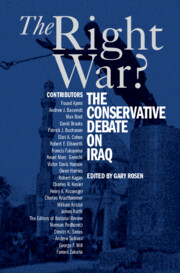Book contents
- Frontmatter
- Contents
- List of Contributors
- Introduction
- 1 Iraq's Future – and Ours
- 2 The Right War for the Right Reasons
- 3 Iraq: Losing the American Way
- 4 Intervention With a Vision
- 5 An End to Illusion
- 6 Quitters
- 7 A More Humble Hawk; Crisis of Confidence
- 8 Time for Bush to See the Realities of Iraq
- 9 Iraq May Survive, but the Dream Is Dead
- 10 The Perils of Hegemony
- 11 Like It's 1999: How We Could Have Done It Right
- 12 Reality Check – This Is War; In Modern Imperialism, U.S. Needs to Walk Softly
- 13 A Time for Reckoning: Ten Lessons to Take Away from Iraq
- 14 World War IV: How It Started, What It Means, and Why We Have to Win
- 15 The Neoconservative Moment
- 16 In Defense of Democratic Realism
- 17 ‘Stay the Course!’ Is Not Enough
- 18 Realism's Shining Morality
- 19 Has Iraq Weakened Us?
- 20 Democracy and the Bush Doctrine
- 21 A Time for Humility
- 22 Birth of a Democracy
- Index
15 - The Neoconservative Moment
Published online by Cambridge University Press: 10 August 2009
- Frontmatter
- Contents
- List of Contributors
- Introduction
- 1 Iraq's Future – and Ours
- 2 The Right War for the Right Reasons
- 3 Iraq: Losing the American Way
- 4 Intervention With a Vision
- 5 An End to Illusion
- 6 Quitters
- 7 A More Humble Hawk; Crisis of Confidence
- 8 Time for Bush to See the Realities of Iraq
- 9 Iraq May Survive, but the Dream Is Dead
- 10 The Perils of Hegemony
- 11 Like It's 1999: How We Could Have Done It Right
- 12 Reality Check – This Is War; In Modern Imperialism, U.S. Needs to Walk Softly
- 13 A Time for Reckoning: Ten Lessons to Take Away from Iraq
- 14 World War IV: How It Started, What It Means, and Why We Have to Win
- 15 The Neoconservative Moment
- 16 In Defense of Democratic Realism
- 17 ‘Stay the Course!’ Is Not Enough
- 18 Realism's Shining Morality
- 19 Has Iraq Weakened Us?
- 20 Democracy and the Bush Doctrine
- 21 A Time for Humility
- 22 Birth of a Democracy
- Index
Summary
One of washington's most exclusive clubs during the 1990's was the annual board dinner of the National Interest. Presided over by founding editor Owen Harries and often kicked off with a presentation by Henry Kissinger, the group included Jeane Kirkpatrick, Irving, Bea, and Bill Kristol, Samuel Huntington, Paul Wolfowitz, Norman Podhoretz, Daniel Pipes, Charles Krauthammer, Marty Feldstein, Eliot Cohen, Peter Rodman, and a host of other conservative thinkers, writers, and doers, including just about everyone now characterized as a “neoconservative.”
What I always found fascinating about these dinners was their unpredictability. People's views were very much set in concrete during the Cold War; while this group was divided into pro- and anti-détente camps, virtually everyone (myself included) had staked out territory years before. The Berlin Wall's fall brought a great change, and there was no clear mapping between one's pre-1989 views and the ones held thereafter. Roughly, the major fault line was between people who were more realist and those who were more idealist or Wilsonian. But everyone was trying to wrestle with the same basic question: In the wake of the disappearance of the overarching strategic threat posed by the former USSR, how did one define the foreign policy of a country that had suddenly become the global hegemon? How narrowly or broadly did one define this magazine's eponymous “national interest”?
It was at one of these dinners that Charles Krauthammer first articulated the idea of American unipolarity.
- Type
- Chapter
- Information
- The Right War?The Conservative Debate on Iraq, pp. 170 - 185Publisher: Cambridge University PressPrint publication year: 2005
- 2
- Cited by



